Related Research Articles

Norman Hackerman was an American chemist, professor, and academic administrator who served as the 18th President of the University of Texas at Austin (1967–1970) and later as the 4th President of Rice University (1970–1985). He was an internationally known expert in metal corrosion.
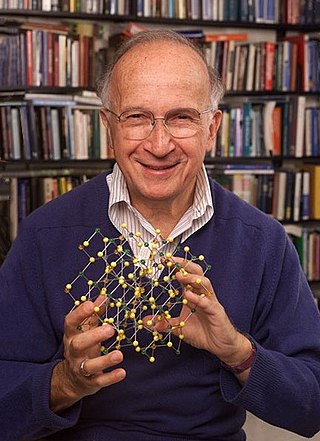
Roald Hoffmann is a Polish-American theoretical chemist who won the 1981 Nobel Prize in Chemistry. He has also published plays and poetry. He is the Frank H. T. Rhodes Professor of Humane Letters Emeritus at Cornell University.

Dudley Robert Herschbach is an American chemist at Harvard University. He won the 1986 Nobel Prize in Chemistry jointly with Yuan T. Lee and John C. Polanyi "for their contributions concerning the dynamics of chemical elementary processes". Herschbach and Lee specifically worked with molecular beams, performing crossed molecular beam experiments that enabled a detailed molecular-level understanding of many elementary reaction processes. Herschbach is a member of the Board of Sponsors of the Bulletin of the Atomic Scientists.

Percy Lavon Julian was an American research chemist and a pioneer in the chemical synthesis of medicinal drugs from plants. Julian was the first person to synthesize the natural product physostigmine, and a pioneer in industrial large-scale chemical synthesis of the human hormones progesterone and testosterone from plant sterols such as stigmasterol and sitosterol. His work laid the foundation for the steroid drug industry's production of cortisone, other corticosteroids, and artificial hormones that led to birth control pills.
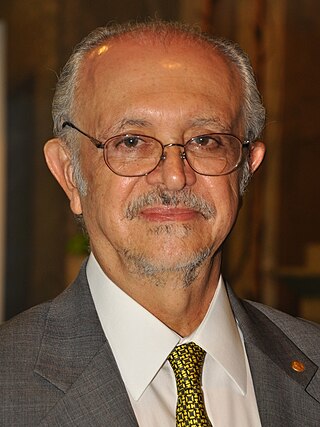
Mario José Molina-Pasquel Henríquez was a Mexican physical chemist. He played a pivotal role in the discovery of the Antarctic ozone hole, and was a co-recipient of the 1995 Nobel Prize in Chemistry for his role in discovering the threat to the Earth's ozone layer from chlorofluorocarbon (CFC) gases. He was the first Mexican-born scientist to receive a Nobel Prize in Chemistry and the third Mexican-born person to receive a Nobel prize.

George Andrew Olah was a Hungarian-American chemist. His research involved the generation and reactivity of carbocations via superacids. For this research, Olah was awarded a Nobel Prize in Chemistry in 1994 "for his contribution to carbocation chemistry." He was also awarded the Priestley Medal, the highest honor granted by the American Chemical Society and F.A. Cotton Medal for Excellence in Chemical Research of the American Chemical Society in 1996.
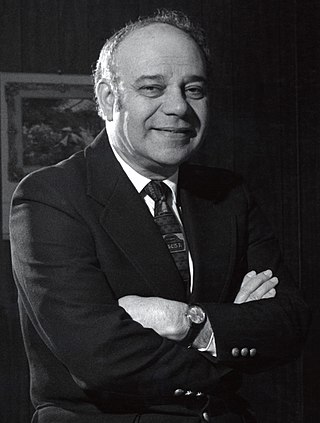
Jerome Karle was an American physical chemist. Jointly with Herbert A. Hauptman, he was awarded the Nobel Prize in Chemistry in 1985, for the direct analysis of crystal structures using X-ray scattering techniques.

Armand Paul Alivisatos is a Greek-American chemist and academic administrator who has served as the 14th president of the University of Chicago since September 2021. He is a pioneer in nanomaterials development and an authority on the fabrication of nanocrystals and their use in biomedical and renewable energy applications. He was ranked fifth among the world's top 100 chemists for the period 2000–2010 in the list released by Thomson Reuters.

Robert Howard GrubbsForMemRS was an American chemist and the Victor and Elizabeth Atkins Professor of Chemistry at the California Institute of Technology in Pasadena, California. He was a co-recipient of the 2005 Nobel Prize in Chemistry for his work on olefin metathesis.

Sir James Fraser Stoddart is a British-American chemist who is Chair Professor in Chemistry at the University of Hong Kong. He has also been Board of Trustees Professor of Chemistry and head of the Stoddart Mechanostereochemistry Group in the Department of Chemistry at Northwestern University in the United States. He works in the area of supramolecular chemistry and nanotechnology. Stoddart has developed highly efficient syntheses of mechanically-interlocked molecular architectures such as molecular Borromean rings, catenanes and rotaxanes utilising molecular recognition and molecular self-assembly processes. He has demonstrated that these topologies can be employed as molecular switches. His group has even applied these structures in the fabrication of nanoelectronic devices and nanoelectromechanical systems (NEMS). His efforts have been recognized by numerous awards, including the 2007 King Faisal International Prize in Science. He shared the Nobel Prize in Chemistry together with Ben Feringa and Jean-Pierre Sauvage in 2016 for the design and synthesis of molecular machines.
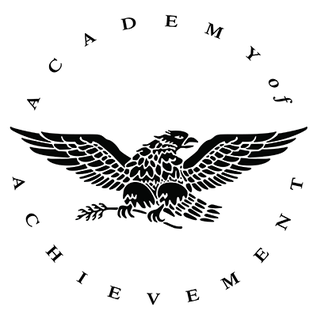
The AmericanAcademy of Achievement, colloquially known as the Academy of Achievement, is a nonprofit educational organization that recognizes some of the highest-achieving people in diverse fields and gives them the opportunity to meet one another. The academy also brings together the leaders with promising graduate students for mentorship. It hosts an International Achievement Summit, which ends with an awards ceremony, during which new members are inducted into the academy.

George McClelland Whitesides is an American chemist and professor of chemistry at Harvard University. He is best known for his work in the areas of nuclear magnetic resonance spectroscopy, organometallic chemistry, molecular self-assembly, soft lithography, microfabrication, microfluidics, and nanotechnology. A prolific author and patent holder who has received many awards, he received the highest Hirsch index rating of all living chemists in 2011.

John Dombrowski Roberts was an American chemist. He made contributions to the integration of physical chemistry, spectroscopy, and organic chemistry for the understanding of chemical reaction rates. Another characteristic of Roberts' work was the early use of NMR, focusing on the concept of spin coupling.

Carolyn Ruth Bertozzi is an American chemist and Nobel laureate, known for her wide-ranging work spanning both chemistry and biology. She coined the term "bioorthogonal chemistry" for chemical reactions compatible with living systems. Her recent efforts include synthesis of chemical tools to study cell surface sugars called glycans and how they affect diseases such as cancer, inflammation, and viral infections like COVID-19. At Stanford University, she holds the Anne T. and Robert M. Bass Professorship in the School of Humanities and Sciences. Bertozzi is also an Investigator at the Howard Hughes Medical Institute (HHMI) and is the former director of the Molecular Foundry, a nanoscience research center at Lawrence Berkeley National Laboratory.

Paul Doughty Bartlett was an American chemist.
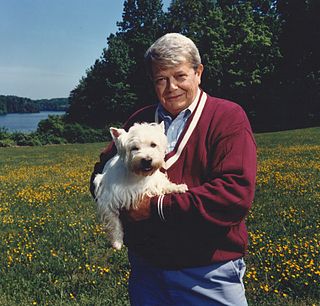
Howard Ensign Simmons Jr. was an American chemist with DuPont who discovered the Simmons–Smith reaction.

Peter John Stang is an American chemist and Distinguished Professor of chemistry at the University of Utah. He was the editor-in-chief of the Journal of the American Chemical Society from 2002 to 2020.

The Nobel Prize in Chemistry is awarded annually by the Royal Swedish Academy of Sciences to scientists in the various fields of chemistry. It is one of the five Nobel Prizes established by the will of Alfred Nobel in 1895, awarded for outstanding contributions in chemistry, physics, literature, peace, and physiology or medicine. This award is administered by the Nobel Foundation, and awarded by the Royal Swedish Academy of Sciences on proposal of the Nobel Committee for Chemistry which consists of five members elected by the Academy. The award is presented in Stockholm at an annual ceremony on 10 December, the anniversary of Nobel's death.
John H. Sinfelt was an American chemical engineer whose research on catalytic reforming was responsible for the introduction of unleaded gasoline.
Véronique Gouverneur is the Waynflete Professor of Chemistry at Magdalen College at the University of Oxford in the United Kingdom. Prior to the Waynflete professorship, she held a tutorial fellowship at Merton College, Oxford. Her research on fluorine chemistry has received many professional and scholarly awards.
References
- ↑ "Cheves Walling Dies at 91". acs.org. June 22, 2007. Retrieved February 9, 2017.
- ↑ "Helium Find Gives Lift to Fusion Chemists : Discovery Backs Controversial Claim of Nuclear Reaction in Simple Experiment". Los Angeles Times . April 18, 1989. Retrieved February 9, 2017.
- ↑ "Walling, Cheves". worldcat.org. Retrieved February 9, 2017.